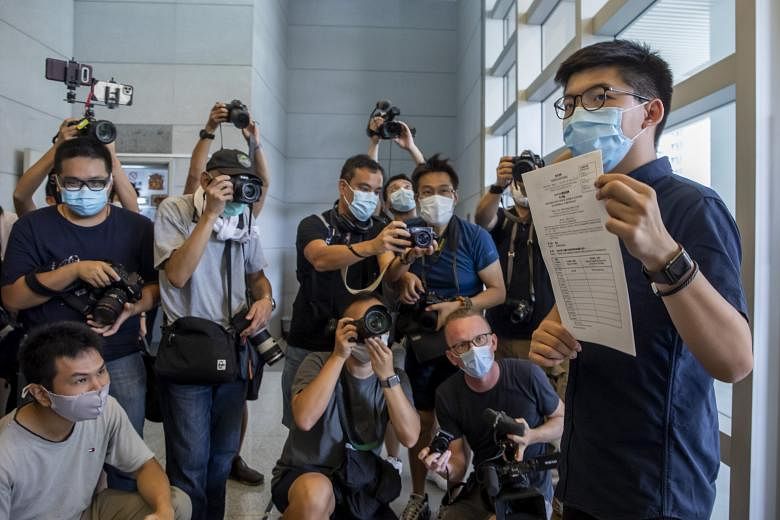HONG KONG • The Hong Kong government is considering postponing upcoming legislative elections amid a recent surge in coronavirus cases, media reports said, prompting criticism from pro-democracy candidates hoping to triumph in the September vote.
Last night, news organisation HK01 and broadcaster TVB cited sources as saying the Sept 6 legislative elections will be held in September next year instead, and the government is expected to announce the decision soon.
Asked why not postpone the election for 14 days instead of a year, sources cited in HK01's report replied that the cost of holding an election is huge and the vote takes a long time to prepare - something that cannot be done in 14 days.
According to Section 44 of the Legislative Council Ordinance, the chief executive may direct the postponement of a general election if the chief executive deems it is likely to be obstructed or seriously affected by a riot, open violence or any danger to public health or safety. The election could be delayed for no more than 14 days.
Chief Executive Carrie Lam's advisory Executive Council was to meet yesterday to discuss postponing the elections, the Hong Kong Economic Times reported, citing people it did not identify.
A government spokesman told Bloomberg News: "The Constitutional and Mainland Affairs Bureau and the Registration and Electoral Office are preparing for the election and shall closely keep in touch with the Food and Health Bureau and the Centre for Health Protection to monitor the development of the epidemic and formulate various plans."
The election would be Hong Kong's first since China's imposition of national security legislation, a move that raised the pro-democracy camp's concerns that it would be used to disqualify its candidates from September's vote. The opposition is hoping to ride the momentum of its landslide victory in last November's District Council elections to a majority in the legislature.
"Increasingly it's looking challenging to hold the election," Mr Bernard Chan, the convener of the Executive Council and a top adviser to Mrs Lam, said in an interview on Monday. "It's not like September is going to be any better. I just can't imagine things will be better and not worse than now, so we have to prepare for the worst."
The report of a potential delay comes after more than half a million Hong Kong residents voted in the opposition's unofficial primary elections earlier this month, defying government warnings and a rise in Covid-19 cases.
"Our bottom line is that we want to hold a safe election, an orderly, fair and just election, but the virus is really an important factor that we cannot neglect," Chief Secretary Matthew Cheung, the city's No. 2 official, said in response to a question on the election at a Monday briefing on virus measures.
Pro-democracy lawmaker Eddie Chu tweeted that China wanted the delay in order to "avoid a potential devastating defeat" and because it was worried about further US sanctions should prominent opposition candidates be disqualified.
Activist Joshua Wong, one of several aspiring opposition candidates who have been queried by electoral officers about past political statements, yesterday accused the government of trying to stifle the city's democracy by disqualifying democracy advocates, or delaying or cancelling the vote.
"Using pandemic as an excuse to postpone the election is definitely a lie," he wrote in a Twitter post.
Separately, the University of Hong Kong (HKU) yesterday sacked veteran pro-democracy activist Benny Tai from his tenured position as an associate professor of law, in a move he called "the end of academic freedom" in the city.
Professor Tai was a leading figure in Hong Kong's 2014 "Umbrella" protests, which paralysed the city for 79 days as demonstrators occupied main roads, demanding greater democracy.
He was sentenced to 16 months in prison last year for two public nuisance offences, but released on bail pending an appeal - a conviction which prompted HKU to begin reviewing his position more than half a year ago.
BLOOMBERG, REUTERS

